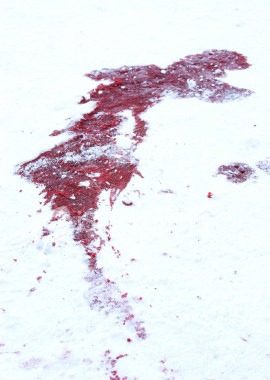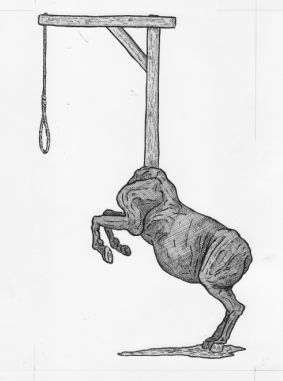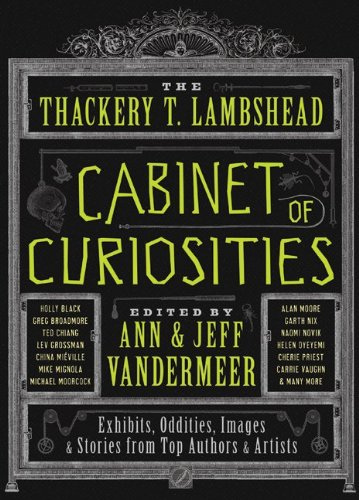Jeff VanderMeer's Blog, page 52
July 11, 2011
The Journals of Doctor Mormeck's Avatar–Entry #7
Note: Been reading this serialized long story/novella? Please support a full-time writer. Paypal to vanderworld at hotmail.com—much appreciated! Donations above $21 will entitle you to a free copy of initial anthology or stand-alone book appearance. Also, let me know you're still reading by posting a comment. Story context:
Living on a far-distant planet, Doctor Mormeck works for strange beings that might or might not be angels by conducting surveillance across a hundred thousand alt-Earths. When an avatar of Mormeck is sent to a war-torn winter city to investigate a mysterious Presence, the doctor will become embroiled an ever-widening conflict.
Archive is here, Journals of Mormeck, and first entry is here.
A day has passed…I had not thought much about my namesake, the Mountain That Remained Behind…until now. Now I think about Mormeck Mountain constantly, wondering what he would do in my stead, because Mormeck Avatar feels compromised by this Komodo skin, this carefully mimicked Komodo brain, this Komodo flesh—so seductive in its strength and speed. Komodo-me likes to stop suddenly and change direction, to go bounding through the snowy woods, to suddenly scuttle up the sides of buildings, feeling the lovely ache and pull of gravity on muscles. Komodo-me makes decisions quickly, too quickly sometimes, and is seduced by the comfortable friendship he has with Sergeant Pavlov, almost to the point of becoming dog-like in wanting to please…although, perhaps that is Mormeck Avatar's fault, too.
We went out to the place where the soldiers had found the laughing German soldier with his head on backwards and flames coming out of his head. It was safer now to go there than before as the Germans had been forced to retreat from the area, even as they had made gains in places farther south.
Rather, Pavlov through a third party ordered the two soldiers back there, and I followed invisible. Pavlov had had them provided with a two-way radio and they had been told that from time to time someone might ask them questions using it. He didn't bother giving me a two-way radio.
"My theory, Mormeck," Pavlov said, "is that given a rational option for a voice coming out of the snow that they will take it. I would like to see this theory tested. Besides, your voice is a little raspy."
What rational theory would explain the sound of a huge reptile moving through snow, I asked him.
Pavlov shrugged. "The human mind is a remarkable thing."
Another overcast day. Air-raid sirens wailed as I shadowed the two soldiers, but everyone knew no air strikes were coming. The sound was as reflexive and empty a threat as a writhing lizard tail, one of many empty rituals during wartime. I kept to the sides of buildings as much as possible, my scuttling covered by the wind, for the snow was deep and flakes lazily descending again. The two men talked to one another as they walked, automatic rifles held with the muzzles pointing down but held by hands that even under their gloves could be seen to grasp too tightly. One was named Uri, the other Aleksei
Uri: "This is bullshit. This is the assignment they give to idiots and morons and dogfuckers. This is the pinnacle of bullshit. We have climbed to the very top of the bullshit. And we are still young.."
Aleksei: "The bull's shit is this—there is nothing to report. When we get back there that crazy dying German will be either crispy or gone."
Uri: "We could say we went to do this bullshit and but not really do this bullshit. I don't want to do this bullshit."
Aleksei: "This bull's shit must be done, Aleksei. If you do not do bull's shit the right way, you wind up paying for the bull's shit…and this kind of bull's shit comes with a heavy, heavy price, my friend."
Uri: "I would have thought bullshit should be done in a bullshit way."
Aleksei: "You would be right if bull's shit was not such a vital part of the system."
Uri: "Why do you keep saying 'bull's shit'? It sounds wrong. Bullshit is much healthier."
Aleksei: "My grandmother said it that way—it's an heirloom. Her bull's shit has been passed down through generations. Don't insult my grandmother. Besides, everything you say sounds wrong, Uri."
Uri just grunted at that, and they fell silent for a long time, which meant I had to be very silent indeed. The sky became darker although we were approaching noon. The two men passed burned-out tanks and the rubble of what had once been luxury hotels or spas. They passed by with a nod or salute Soviet patrols: gaunt men and some women who were returning from night fighting and looked nocturnal in the dark rings round their eyes and the paleness of their faces. A lone swallow swung through the air like a dark and narrow dart. The snowflakes fell harder until even with my superior vision the world became a kind of pointelist painting in white with dark shapes glimmering through. Even though I could regulate my temperature with ease, I felt the chill of a uniquely Russian winter. I felt the gloom…and the peace of that gloom. Even the crunching of Uri and Aleksei's boots was in an odd way comforting to me, even though I had no childhood memories of snow to create that reaction. This reassured me later, because the Komodo would not have appreciated any of that.
At first, they could not find the site. Then they found the site—near an odd, cracked geodesic dome that stood four stories high. They found nothing there. Bt then, a little to the side, Uri pointed to a dark stain in the snow. Aleksei agreed it was trail of burnt blood, leading around the side of the dome.
"Do we follow that, Uri?"
"Do you follow a chain to see if there is a dog on the other end?"
"You do if there is a firing squad behind you."
"So you want us to make friends with the dog?"
"If the dog is dead, making friends is much easier than expected."
"What if he is just resting, waiting for the bullshit inspectors to happen by?" Uri asked.
Aleksei had no reply to that one.
They never mentioned their dead comrade, the one who had been killed by the German, as if to do so would be bad luck, perhaps.
I'd already run into a back alley and then up the side of a building where I could jump down onto the dome, and so I circled them from above as, having reached a decision, they circled below, following the blood, rifles held at the ready, the wind whipping their faces. Although I had a higher perspective I, like them, had a restricted perspective, so that each few feet heightened the tension as the burned trail of blood continued on. Each curling progression felt oddly like walking farther down a dark tunnel.
But at the back of the dome, the trail ended abruptly. In the midst of a circle of offal: a pair of men's legs in heavy white trousers and ragged boots stuck up out of the snow, torso half-hidden beneath, as if the person had tried to dive into the ground. A few feet off to the side a head lay in the snow, the latest flurries having brought the snow up over its mouth. The eyes were blank and milky, staring off into the distance, the cheekbones drawn, the nose sharp, the mouth tight and small. Someone had clearly been by and put his helmet back on his head, as if he still had need of it.
The sight brought Uri and Aleksei up short. They stood for a second as I looked down on them and the dead man.
"Now what?" Aleksei asked.
"Now what what?" Uri replied.
"What do we do with this bull's shit?"
"I'm not hauling it back to headquarters, if that what you mean," Uri said.
"That isn't what I mean. Not only am I not hauling it, Uri, I am not going any nearer. Look at that—what possesses a decapitated man to dive into the snow."
"My powers of reasoning tell me that a man on fire will do many strange things," Uri said.
"Including pulling off his own head and tossing it to the side before taking a dive?" Aleksei asked.
"Let's get out of here," Uri said.
But that's when the head began to mumble and laugh a little, spewing snowflakes in a miniature flurry, and the up-ended legs to bicycle through the air in an unnerving way, even to me.
Uri and Aleksei stood frozen. There is no other way to say it. For all of their banter, for all of their bravery in having followed the blood trail, they now stood frozen, as if the German head's mumbling was a spell binding them.
And I felt a presence like a weight pressing up against the insides of my skull, against my brain, so strong that it pushed my body tight against the side of the dome.
Something was coming. The German soldier was a trap or a signal or a beacon or something even worse, and they'd meant for me to come here, and I was doomed, I was doomed, and I couldn't tell if that thought came from my own thoughts or the presence in my head, bearing down, and with what resolve I had left, what will, I half-fell, half-skittered down the side of the dome and I gathered up a terrified Aleksei in one arm and a horrified Uri in the other because I would not see them harmed because of me, and I ran from that place as if I were a true human believer fleeing from the gates of Hell, the whole time wondering what would come next, what could possibly come next.
So it never came down to a child's game involving two-way radios, and I lie here now in a hidden place—far from Pavlov's House, far from anywhere—hyperventilating as I write, and thinking over and over "Is it gone? Is the presence gone? Is it really gone?" Because I think it is, but what if it didn't leave because I was out of range but instead went dormant, went into hiding? What if what if what if? I feel more like an isolated Mormeck Outpost than ever before.
Pavlov had been thinking about the burning German on a completely different tactical level, and I had let him because I trusted his war experience. But this wasn't like any enemy he had ever faced. And I had never encountered anything like it, either.
The presence made me want to claw my own brain out of my head. To take a pick axe and break my skull open and pick through the pieces.
To do anything to get it out.
The Journals of Doctor Mormeck's Avatar–Entry #7 originally appeared on Ecstatic Days on July 11, 2011.




July 9, 2011
The Museum of Intangible Arts and Objects: Reza Negarestani, China Miéville, and the Gallows-horse
One of the great treats for Ann and me while working on The Thackery T. Lambshead Cabinet of Curiosities anthology was not only to include fiction and art by China Miéville but also a remarkable story based on Mieville's art by Reza Negarestani. The author of the incredibleCyclonopedia (which I wrote about here), Negarestani often blurs fiction, nonfiction, and philosophy in mind-bending ways. He's one of those writers whose genius is that the images and ideas in his work take over your brain and alter your perception of the world. We're forever indebted to China for introducing us to his work.
anthology was not only to include fiction and art by China Miéville but also a remarkable story based on Mieville's art by Reza Negarestani. The author of the incredibleCyclonopedia (which I wrote about here), Negarestani often blurs fiction, nonfiction, and philosophy in mind-bending ways. He's one of those writers whose genius is that the images and ideas in his work take over your brain and alter your perception of the world. We're forever indebted to China for introducing us to his work.
As part of the continuing celebration of the Lambshead anthology (official release date July 12), I asked for some thoughts on his story, and have posted both that and an excerpt from "The Gallows-horse" below. One of the strengths of a book like the Cabinet antho is that it can, with ease, encompass both traditional storytelling and the avant garde…
Negarestani on "The Gallows-horse"
Gallows-horse is a fictional triptych written for China Miéville's viscously challenging drawing depicting the abutment of a horse and gallows. Viscously challenging because the crypto-literal combination tells us what it 'cannot' really be: a horse that takes the convict to the gallows, or literally, a gallows-horse. So the mission was to reinvent this deliberately self-referencing combination in a geometrically weird environment. At first glance, two different approaches could be taken: (1) Renaming this object to something other than what it is (something that should not be called gallows-horse anymore); (2) Replacing these literal associations with non-literal relations, redeeming this apparently literal object with an exotic object through convoluted descriptions and esoteric conjunctions. Resisting these two slightly reactionary approaches, a third tactic was developed: Rather than escaping what the object manifestly was through feats of exoticism, the surplus literality of the illustration that is itself patently weird was embraced and amplified. So the literality of gallows+horse was trisected into three objects: the literal combination of gallows and a horse as a semantic or linguistic object, the literal abutment of gallows and a horse as a visual or optical object and finally, the literal merger of the two as a mental or traumatic object. Since each of these objects were only depicting one aspect of the combination 'gallows plus horse', they had to be reunited in one way or another to reconstruct the gallows-horse as depicted in Miéville's illustration. So the second mission was to develop a story and a continuous plot by which the generic combination of gallows and a horse could transform into a particular combination, THE gallows-horse. In a way, this was an exercise in teratological surgery.
The story with its almost superficially constructed plot, its dramatic turns and twists, emotional cusp, minimal characterization and even plot holes, riddles and clues is only there to reunite these three objects or gallows-horses (the linguistic, the optical and the mental). Within the story, the literality of the gallows-horse is not an obstacle that should be overcome but a ladder that facilitates the ascension of the reader to the heart of Saragossa's Museum of Intangible Art and Object (an obvious reference to Potocki's novel), the hall of the Man-Object where 'the Edifice of the Weird' is vigilantly preserved.
Excerpt from "The Gallows-horse"
The letter to the Museum of Intangible Arts and Objects states that none of the early references to the gallows-horse written between 1936 to 1959 described or even identified it as an object or a thing. During this period the gallows-horse continually appeared in the form of a chameleonic crypt or a cipher that opportunistically mimicked the semantic context of the sentence or the phrase it inhabited. It has been unanimously confirmed by the members of the research collective that in its larval stage of development between 1936 to 1959 before it began to fully appear as an object—at least as objects are commonly known—the gallows-horse has been a linguistic crypto-object with parasitic behaviors. "Like a menace which must be assimilated by its foes to defeat them from within," the research collective emphasizes, "the early form of the gallows-horse tends to adapt—in the most esoteric way—whatever meaning the sentence that hosts it conveys. This uncanny linguistic crypto-object demonstrates its independent reality by moulding the world of the conscious and thinking subject around itself, literally thinking the subject that thinks it."
During its incubation period, the gallows-horse was simply feeding off of contexts and linguistic connections in Dr. Lambshead's notes and memories in order to build an empty cognitive carapace around itself. In this period, therefore, the gallows-horse cannot be understood in terms of an emerging thing, whether this new thing would be an idea, a thought or a corporeal object. Adamantly refusing to be considered as something (let alone a unified thing made of a gallows and a horse), the gallows-horse is the very personification of the primordial death of all meaning par excellence that oscillates between sense and non-sense depending on its mode of deployment against the parameters of human perception. In this early linguistic incubation period, the deeper you dig into the context where the gallows-horse is buried, the more promiscuous you find the gallows-horse is in relation to its semantic and semiotic neighbors. In digging for the true gallows-horse, you simply dig out nothing. In its basal form—that is the gallows-horse before it is born as a distinct idea and is manifestly imagined—the gallows-horse can be anything precisely because it is nothing.
Image of the gallows-horse copyright (c) 2011 China Miéville; text copyright (c) 2011 Reza Negarestani.
The Museum of Intangible Arts and Objects: Reza Negarestani, China Miéville, and the Gallows-horse originally appeared on Ecstatic Days on July 9, 2011.




My Fungal Weapons Versus Your Dragon: Fantasy Mortal Combat
So I'm bored today. So I'm gonna ask you a question. If any fantasy/SF authors got in a battle against one another and they had to fight through proxies like weapons, allies, etc, and were able to summon up anything weapon-y from their novels, including beasties as allies, to use in that conflict…what match-ups would you find interesting, and whose weapons would help them win?
Personally, I'd like to see Pern dragons versus GRRM dragons, sand worms versus Smaug, space squid versus…something.
If everybody mentions just male authors, I'm gonna send my fungal weapons after you. And they burn.
My Fungal Weapons Versus Your Dragon: Fantasy Mortal Combat originally appeared on Ecstatic Days on July 9, 2011.




July 8, 2011
The Journals of Doctor Mormeck (Mountain)–Entry #13
Note: Been reading this serialized long story/novella? Please consider supporting a full-time writer. Paypal to vanderworld at hotmail.com. Donations above $21 will entitle you to a free copy of initial anthology or stand-alone book appearance. Context:
Living on a far-distant planet, Doctor Mormeck works for strange beings that might or might not be angels by conducting surveillance across a hundred thousand alt-Earths. When an avatar of Mormeck is sent to a war-torn winter city to investigate a mysterious Presence, the doctor will become embroiled an ever-widening conflict.
Archive is here, Journals of Mormeck, and first entry is here.
It has been five days since my last confession, father, and I have sinned…Except I don't believe in God or priests, despite the fact Marty does, and my "father" was my mother, too, and s/he flung me out across the universe, a gigantic seed pod insulated against the vacuum, to fall where I would, my decaying orbit bringing me to this distant planet where I gradually grew into an awareness of myself…and of the angels.
Gabriel came to me not long after my last entry. He was unhappy with my surveillance progress. He seemed suspicious of my lies about why I had been unable to extract information from Marty the lighthouse keeper.
"Use the luna moths to occupy her brain. Extract any information directly from the cortex," he told the mountain that had in fact been in full retreat from any action that might be considered invasive where Marty was concerned.
I told him I would and then Gabriel pointed out another reality nearby. "Don't worry, Mormeck—we can always put you on another surveillance track." This mountain had to stop from shuddering at the thought of being separated from Marty.
I knew this other reality—I had surveiled it briefly before. On that alt-Earth, a vast civilization pushed south from the Arctic, sending ahead their floating ghost-whale spirit weapons. These floating ghost-whales glided across the surface of the world and anyone they touched, anyone who came within the influence of their wallowing bodies, faded into the past of another, random reality—ceased to exist in the present. They emitted whale-song as they came, a deceptively sonorous psych-weapon that could break eardrums and brought fear to the invaders. The invaders had come from across the sea and had misjudged everything that could be misjudged. They had occupied territory and torn up the land while dismissing indigenous tech that was not inferior but simply different because it existed across dimensions, requiring only unity of purpose to bring forth. Those who retreated did so for strategic not tactical reasons. Now the invaders fell back in disarray, still unable to grasp the scope of their mistake.
But this Earth also existed in a kind of temporal hiccup where everything kept happening over and over again. The spirit-whale advance would reach a certain point, re-set, and begin again—so many times that now the commanders of the northern armies headed south, and their civilian leaders, knew like an echo of an echo in their brains what was happening—a subconscious message received from the near future—and in a thousand minute ways were intent on altering their decisions to try to effect some sort of change. Gabriel had told me that eventually the hiccup would feel the combined psychic pressure of this and it would end…but not even the angels knew if that reality would then proceed normally or cease to exist.
Sometimes the angels hid their wings and traveled there and let the spirit whales dissolve them into the past as a kind of strange jest or joke. The most adventurous would wait until the very second of the temporal hiccup before diving in, and thus be subject to any number of dangerous and random possibilities. Those who survived their comrades would find and bring back and restore their memories. It may have been meant as some kind of adventure, even some sort of rite of passage, but I thought there was a hint of desperation and sadness to it. That the angels, Gabriel included, really wanted to forget, but had to disguise that impulse as play.
But what did they need to forget? The cruelty of decisions they said they made for the greater good? Something much worse?
I am beginning to think I don't believe in angels, either.
The Journals of Doctor Mormeck (Mountain)–Entry #13 originally appeared on Ecstatic Days on July 8, 2011.




A Sampling of Visual Birthday Wishes: I Wish to Be Feared
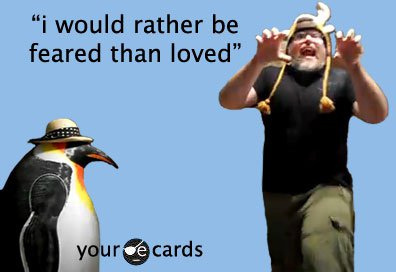
(Like this image by Todd Vandemark? For liking it, you owe it to me to buy this.)

(Leah Thomas sent me this, after I questioned whether a bear hat she'd mentioned was plush or real. The offending word I crossed out for this version.)
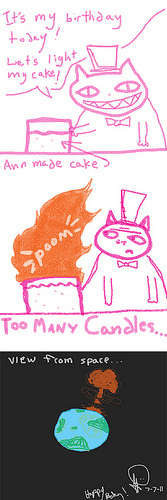
(Jeremy Zerfoss sent in this one because he's nutso.)
Evil Monkey:
How was your birthday?
Jeff:
Good! I worked hard, I wrote, I played hard. I observed internet kerfuffle with wry amusement and horror, as usual. Ann bought me a nice dinner and got me a thoughtful gift. We watched House.
Evil Monkey:
I was out getting naked in bars.
Jeff:
Glad I missed that.
A Sampling of Visual Birthday Wishes: I Wish to Be Feared originally appeared on Ecstatic Days on July 8, 2011.




Lambshead Cabinet Anthology: Attack of the Clockroach!–Mike Mignola, Cherie Priest Exclusives!
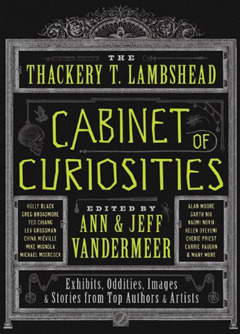
As part of the pre-launch for our fiction-and-art antho The Thackery T. Lambshead Cabinet of Curiosities: Exhibits, Oddities, Images, and Stories from Top Authors and Artists , you can now read an exclusive excerpt from Cherie Priest's story, with a reveal of Mike Mignola's art. "The Clockroach" is one of my favorites from the anthology. Mignola created four originals for us and then gave us the names of writers he'd like to work with. Priest then wrote the story and in the process named the artifact pictured "The Clockroach". The other three writers who created stories to Mignola art are Michael Moorcock, China Mieville, and Lev Grossman.
, you can now read an exclusive excerpt from Cherie Priest's story, with a reveal of Mike Mignola's art. "The Clockroach" is one of my favorites from the anthology. Mignola created four originals for us and then gave us the names of writers he'd like to work with. Priest then wrote the story and in the process named the artifact pictured "The Clockroach". The other three writers who created stories to Mignola art are Michael Moorcock, China Mieville, and Lev Grossman.
The excerpt shows the more serious side of the story to some extent, while in the book Priest's frequent footnotes add darkly (and not so darkly) humorous context. And to show the synergy that sometimes occurs in these situations, the clockroach may appear in a Lambshead-related novel I'm working on in the near future.
More coverage of the anthology later today—and next week, a special, ultra-cool surprise to coincide with the official release date.

Ooooh! Could that be part of the Clockroach?!
Lambshead Cabinet Anthology: Attack of the Clockroach!–Mike Mignola, Cherie Priest Exclusives! originally appeared on Ecstatic Days on July 8, 2011.




July 7, 2011
The Thackery T. Lambshead Cabinet of Curiosities: Can Artifacts Be Disgruntled?
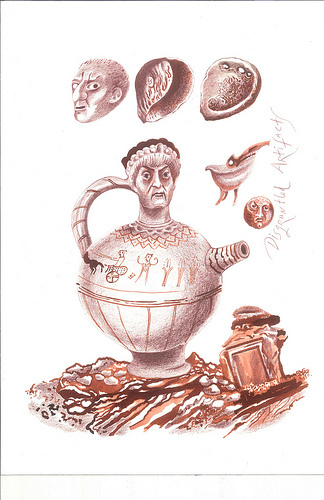
(Image from the "A Brief Catalog of Other Items" section of the Lambshead anthology)
HarperCollins' link to retailers for the Lambshead Cabinet.
Today kicks off a week of blogging about the new anthology The Thackery T. Lambshead Cabinet of Curiosities, edited by Ann VanderMeer and yours truly. Contributors include Holly Black, Greg Broadmore, Ted Chiang, Amal El-Mohtar, Minister Faust, Jeffrey Ford, Lev Grossman, N.K. Jemisin, Caitlin R. Kiernan, China Mieville, Mike Mignola, Michael Moorcock, Alan Moore, Garth Nix, Naomi Novik, Cherie Priest, Ekaterina Sedia, Jan Svankmajer, Rachel Swirsky, Carrie Vaughn, Jake von Slatt, Tad Williams, Charles Yu, and tons more.
A lot of our favorite writers and artists are in this book, including the dual-threat Rikki Ducornet, an amazing surrealist writer who also paints. For the Lambshead Cabinet, she gave us a cheeky image entitled "Disgruntled Artifacts". I've posted it above, and you can click on it to see it much larger.
Although Rikki's having fun with the image, it is true that artifacts can be disgruntled, in the sense that one reason we thought a "cabinet of curiosities" concept would work is that people are attached to objects. There's often an emotional resonance in our connection—either because of who made it or who gave it to us. There's also the question of context—artifacts taken out of context can be harmless or fraught with echoes and linkages. You cannot see a sarcophagus in a British museum, for example, without thinking about why it's there, how it got there, and why it isn't somewhere else.
There are plenty of reasons for us to project "disgruntled" onto artifacts, though. Sometimes an artifact is in the wrong context to begin with—for example, "The Clockroach" in our book, story by Cherie Priest and image by Mike Mignola. That was never going to end well.
On the other hand, recontextualizations can "cook" certain types of for lack of a better term, "disgruntilization". Russian painter Vladimir Gvozdev's depictions of mechanical animals, two of which are included in the Lambshead Cabinet, repurpose the example of a German mechanic who lived in Russia at the beginning of the twentieth century. says Gvozdev, "After Germany's defeat in the First World War, the mechanic went mad and was held in a lunatic asylum for life. There he began inventing vergeltungswaffe, a German term for 'vengeance weapons.' I never saw his blueprints, but I liked the story so much that I tried to make via my blueprints a sort of portrait of the inventor himself—to create a little museum out of the mind of that German mechanic." The results are hybrids that take the sting out of the original idea without being any less interesting.
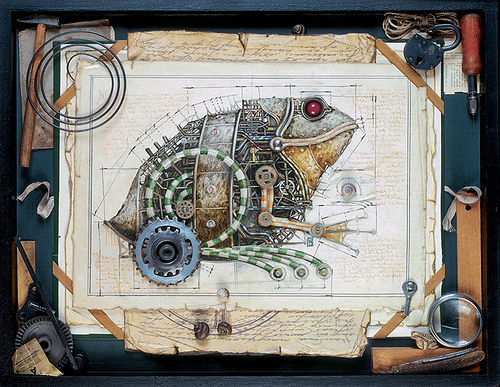
(Gvozdev's art has appeared in our Steampunk Reloaded anthology and The Steampunk Bible, in addition to the Lambshead Cabinet.)
The Thackery T. Lambshead Cabinet of Curiosities: Can Artifacts Be Disgruntled? originally appeared on Ecstatic Days on July 7, 2011.




The Journals of Doctor Mormeck's Avatar–Entry #6
[image error]
(More info on this image here.)
Note: Been reading this serialized long story/novella? Please consider supporting a full-time writer. Paypal to vanderworld at hotmail.com. Donations above $21 will entitle you to a free copy of initial anthology or stand-alone book appearance. Context:
Living on a far-distant planet, Doctor Mormeck works for strange beings that might or might not be angels by conducting surveillance across a hundred thousand alt-Earths. When an avatar of Mormeck is sent to a war-torn winter city to investigate a mysterious Presence, the doctor will become embroiled an ever-widening conflict.
Archive is here, Journals of Mormeck, and first entry is here.
The political officer for Sergeant Pavlov's platoon was named Boris Mikhailovich Bashmachkin, called something similar to "Boris the Bore" behind his back. Bashmachkin outranked Pavlov in several ways. For example, at a word to Moscow from Boris the Bore, Pavlov would find himself in front of a firing squad or sent to a work camp in the Far East.
That these eventualities were perhaps less eminent due to Pavlov's popularity did not mean Bashmachkin couldn't as Pavlov put it "make a nuisance of himself." In other timelines, political officers stepped down after 1942. In this timeline, their power only expanded and broadened, until in a decade's time they would live like despotic ticks feasting off of black-market deals for military equipment, paralyzing the battle-readiness of many units. This would lead, in part, to more famines in the 1960s and the overthrow of a by then senile and blind Trotsky, pulled unmercifully from his fortified offices in the Kremlin and, in the Red Square where he had so often performed troop reviews, torn apart by his former supporters. Several angels had attended that show, according to the records in my head, and found it "most entertaining."
"Yes, Mormeck," Pavlov said experimentally, for I had just recently revealed my name. "He is a nuisance. He makes my men nervous. He wants kickbacks from me in return for not pursuing their ideological crimes. Yes, my men curse too much. Yes, I find their little stage productions with bits of sausage for puppets odd and confusing. But I ask you, Mormeck: wouldn't you engage in black humor if you had a mound of dead Germans to look at every night? And an ocean of live ones to fend off each morning? And how am I to get you what you want if this Boris is always in the way?"
"How long did you practice that speech?" I asked him.
"Only for a few minutes while I shaved this morning," Pavlov replied, a secret amusement revealed mostly through his eyes.
"What do you need from me?"
"Did I mention the tea party? I am throwing a tea party. For Boris. Perhaps you could attend if your social calendar is open?"
***.
The "tea party" took place the next night, in Pavlov's underground offices. He had pulled the table out from the wall, placed a clean tablecloth upon it, a fancy tea cosy and a half-decent tea pot in the middle. At his chair, positioned so his back would be against the wall, Pavlov had placed a shot glass and a bottle of vodka. To the left, where I sat, another shot glass. Opposite Pavlov, a very fancy tea cup with a floral design, sitting atop a gold-fringed saucer. It was probably the only undamaged tea cup in the entire building.
Promptly at 8pm Boris arrived via the secret tunnel and knocked on the door. I remained sitting but turned invisible, while Pavlov unlocked the door and ushered Boris in with a sweep of his arm.
"Welcome, Comrade Bashmachkin! Welcome to our tea party."
Boris the Bore had a big, flushed, almost jowly face but would not have been considered unhandsome by many—tall, well-built, in his mid-forties. The most noticeable defect to his handsomeness were his black eyes, which sat in weary ripples of wrinkles. He had a nose like a cleaver but his chin compensated for it. He would have made a very good statue, and Pavlov had said more than once that "from afar in particular he has what one might call a noble visage." He smelled to me like pork sausage, onions, and aftershave. He wore a great coat that he gave to Pavlov with a kind of odd half-salute, as if he didn't know what to do with his hands.
"I am happy, comrade, to have the opportunity to sit with you," Boris said, then noticed the shot glasses as he sat and Pavlov slid into his own chair against the wall. "But what is this? Are we drinking, too?"
Pavlov gave a thin smile. I shifted back in my seat imperceptibly. I was crammed into the corner and afraid my hot breath might register before it should.
"I am drinking," Pavlov said. "Have some tea," and he poured a cup for Boris, steam rising from the spout. I must admit, it had a fragrant, almost spicy smell that filled the room with a sense of false comfort.
Boris laughed nervously, then took a sip of the tea. He was looking at the second shot glass, resting at my place at the table. "And will we have company?"
Pavlov ignored him. "Comrade," he said, "I thought it might be good for us to talk privately so that we might reach an understanding."
Boris took another sip, said, "I had hoped you might say that." Now he smiled, apparently relaxing a little. Perhaps he had decided to forget about the second shot glass.
"Let's drink to it, then," Pavlov said, and he poured himself a shot, also filling my glass. Pavlov lifted his shot glass, gestured for Boris to do so as well with his tea cup.
"But what are we toasting?"
"Our understanding."
"But we haven't discussed our…understanding."
Pavlov downed his shot. "Haven't we?"
Boris's face got redder. Now he clearly thought he was being made fun of. "No we haven't," he said, and then added, rather petulantly, "And even if we had, surely comrade it would not be sealed with one party drinking vodka and the other drinking tea. Especially when you've poured for the invisible man like you're touched in the head."
"You shouldn't be drinking tonight," Pavlov said.
Boris half-rose from his chair. "I don't like your tone, sergeant. I don't like it at all."
"I think it is time to introduce you to my other guest," Pavlov said.
I materialized in my chair: an enormous wingless "dragon" with a bullet head, fangs the size of Boris's forearm, and claws to match.
A kind of strangled choke came out of Boris, and he remained frozen, not standing and not sitting.
"Sit down, comrade," Pavlov said in a flat voice.
Boris sat. It seemed all he was capable of. He was still trying to breathe, and he was still staring at me as if I were all the demons of Hell wrapped up in some lizard skin. He could not seem to look away from his own doom.
Delicately, almost daintily, I picked up my shot glass and downed my vodka. A splendid fiery burn spread through my body.
"You shouldn't be drinking, Boris," Pavlov said. "If you were drinking, your senses might be impaired. You might believe that whatever you saw tonight was a product of your drunkenness. You might begin to think you had imagined it."
Boris had now managed to wrench his gaze from my Komodo face and was most studiously avoiding my gaze by staring at Pavlov. But except for incomprehensible noises nothing came out of his mouth. He was shaking a bit, too.
Pavlov continued as I made snorting and growling noises: "As for our 'understanding', Boris, let me remind you so you do not forget. You are preparing certain reports to your superiors concerning what you see as suspect speech and activities on the part of me and my subordinates. You will find your way to a favorable interpretation instead. Further, you will stop interfering in my communications with my commanding military officers. And from this point you will report to your superiors that Pavlov's House is ideologically pure in its noble fight against the invader. And you will continue these favorable reports until either this house is rubble or we have won…and forever after." More practice by Pavlov in front of the mirror.
An attempt at speech came out of Boris's quivering mouth, but it was incomprehensible.
"DO YOU UNDERSTAND?" I shouted at him out of the blue. "DO YOU UNDERSTAND?"
That jolted him out of his shock. "You can talk? You talk?"
"YES I TALK. DO YOU UNDERSTAND, PATHETIC HUMAN CREATURE?!"
And he cried out, "I understand! I understand!" But, of course, he didn't understand anything, which is why he was so afraid.
I, dragon, half-rose out of my chair and loomed over Boris. "AND IF YOU DO NOT DO AS PAVLOV ASKS, I WILL RIP YOU LIMB FROM LIMB. I WILL SMACK YOUR HEAD OFF YOUR BODY. I WILL TEAR OUT YOUR ENTRAILS. I WILL SNAP YOUR LEGS OFF. I WILL FEAST ON YOUR REMAINS FOR WEEKS. AND WHEN YOU ARE NOTHING BUT A SOUL, I WILL REND YOUR SOUL AND DEVOUR IT UNTIL YOU ARE NOTHING BUT A PILE OF MEDALS IN A CARDBOARD BOX." Now he felt my hot breath. Even Pavlov was looking at me a little uncertainly, although later he said it was because he thought the "pile of medals" line was anti-climactic.
"I-I understand," Boris said. "I understand the understanding. I understand the understanding. I understand it!"
"I am glad we could have this little talk," Pavlov said. "You may leave now. Be assured that my friend here will be shadowing you from time to time."
On ropey legs, Boris stood and turned toward the door, expression blank. He gathered up his coat himself, put it on, although it took four tries. Put on his hat. Wound his scarf around his neck.
He opened the door and, as if to make sure he had not imagined it after all, stole a glance back at us: just a dragon and a sergeant having a couple of shots of vodka. "You can talk," he croaked.
I gave him my best hissing roar: "SHUT THE DOOR BEHIND YOU!" and he ran shrieking, although not without slamming the door shut behind him.
Pavlov poured us both another shot. "And now to business."
"That wasn't the business?" I can't claim it hadn't felt good to frighten Boris. It might not be my proudest moment, to admit that, but it's how I felt, as if I had accomplished something.
"No, not entirely." He handed me a piece of paper. "I typed it up from examining the reports of various patrols."
I read it with mounting interest.
Unusual Events Reported in the Past Week, Stalingrad and Environs
—Half-naked woman running through street with several children.
—Giant crow cawing words in German
—Palm tree growing in courtyard (unsubstantiated)
—Explosion of mouse population on northwest bank of the Volga
—Ghosts seen near mass gravesite (reporting soldiers drunk)
—German soldier observed to be walking calmly through the snow, helmet off. The soldier's head was on backwards and his hair appeared to be on fire or there was an orange flame shooting out of his skull. When approached by three of our soldiers, he began to laugh and advance on them with no fear. He is reported to have said, in German, "You have no agency here," or perhaps "You have no agents here." He was advancing backwards, so they could see his face. It looked as if it were made of stone. When they shot him and it had no effect, he reached out a hand and made a gesture, and one soldier dropped dead. The other two fled. The German soldier shouted after them, "Tell the [word garbled] they're next."
"You saved the best for last," I said, the Komodo side of me suddenly excited even as the Mormeck part of me was more cautious.
Pavlov smiled. "The others were not really that unusual. The last item seemed perhaps…very unusual. And these two are good soldiers. They drink very little. They have only been here a few months."
"Can they take me to where they saw this man?"
"Perhaps Boris could be persuaded to…"
Pavlov's smile widened until I could see his teeth.
The Journals of Doctor Mormeck's Avatar–Entry #6 originally appeared on Ecstatic Days on July 7, 2011.




July 6, 2011
It's My Birthday Already! (Somewhere)…And: All I Want for My Birthday Is…
Let's get this out of the way first…my birthday is July 7…and honestly I don't want nuthin' from nobody…except one little thing. If you want to get something for me—buy The Thackery T. Lambshead Cabinet of Curiosities fiction and art anthology for yourself…and for some friends. It's available for a sick steep discount on Amazon at the moment. You can skim downriver on this blog to see more info on the antho, or look at this amazing contributor list: Holly Black, Greg Broadmore, Ted Chiang, John Coulthart, Rikki Ducornet, Amal El-Mohtar, Minister Faust, Jeffrey Ford, Lev Grossman, N.K. Jemisin, Caitlin R. Kiernan, China Mieville, Mike Mignola, Michael Moorcock, Alan Moore, Garth Nix, Naomi Novik, Helen Oyeyemi, J.K. Potter, Cherie Priest, Ekaterina Sedia, Jan Svankmajer, Rachel Swirsky, Carrie Vaughn, Jake von Slatt, Tad Williams, Charles Yu, and more!
…now that I've dispensed with that essential information—yes, it's true, I've hit the ripe old age of 43. I'm one year dumber, creakier, crankier, less productive, and all of the other things that happen when your body begins to decide it's a slide downhill…except it doesn't really feel like that.
I can't say the period from my birthday on through to the end of 2010 was too great. I gained 15 pounds, had oodles of stress over impossible deadlines, and in general often felt out of balance. But the first half of 2011 has been rejuvenating. I got back into the exercise and weightlifting and dropped some weight, got back into working on fiction, novels and stories, and the schedule lightened up a bit. Deadlines, yes, but nothing involving hundreds of gatekeepers, rights acquisitions, etc. No, this year has thus far been one to bask in the spoils of hard work–nonfiction collection, Steampunk Bible, Lambshead Cabinet antho, a line of cool Cheeky Frawg e-books, a The Weird from Atlantic in October, and our awesome ODD? anthology.
Not to mention great trips to Amsterdam, Finland, and Poland, among others. Not to mention being two-thirds of the way done with my novel Borne, doing the Mormeck serial fiction project, working on the illustrated writing book for Abrams, planning the Most Incredible space opera/deep space trilogy with the most excellent Karin Lowachee, and getting ready to write new Ambergris stories to Richard A. Kirk's art…full schedule, but whenever it's fiction mostly, I feel centered, balanced, and in control, so it's all good.
How did I survive to the age of 43 with a writing career intact and going strong? Good question. Here are a few possibilities.
—In general, I take care of myself and have good friends and a great wife.
—I am sometimes snarly and bearish on the internet, which means fewer people give me sh*t out of wanting to avoid my inner curmudgeon.
—The deafness in my left ear just means I hear less b.s.
—I'm as passionate and committed to writing now as I was as a pup in my teens.
—I sleep in a special suit in a giant vat of formaldehyde every night.
—I eat only endangered animals, fresh from the grill.
—Hard work and incredible luck.
Anyway, Ann's taking me out for dinner tomorrow for my favorite food, and everything's looking up. So…that means I'll be hit by a bus soon, right? Right.
Full-time writer's life. Dance dance dance. Get hit by bus. Pick yourself up. Dance (a little wary)…dance dance! Get hit by– …you get the idea.
Thanks everybody I know for being so wonderful and creative and energizing. Love you all. (Better not get use to the warm fuzzies.)
It's My Birthday Already! (Somewhere)…And: All I Want for My Birthday Is… originally appeared on Ecstatic Days on July 6, 2011.




The Cabinet of Curiosities 2011 Summer Tour: Ann & Jeff VanderMeer
We're going on the road! Below find the details on our summer appearances. Expect fun, fun, and more fun…
The Book
"The narrative scope and stellar assemblage of writers and illustrators…makes this a book that will be absolutely cherished by fantasy, science fiction, and steampunk afficionados alike." – Paul Goat Allen, B&N Book Club, on The Thackery T. Lambshead Cabinet of Curiosities
Hugo Award winner Ann VanderMeer and World Fantasy Award winner Jeff VanderMeer will be touring this summer and fall promoting The Thackery T. Lambshead Cabinet of Curiosities, a unique blend of fiction and images. Debuting in early July, the Cabinet of Curiosities just made the LA Times summer recommended reading list and includes amazing new fiction and art by Hellboy creator Mike Mignola, Alan Moore, China Mieville, Lev Grossman, Holly Black, Naomi Novik, and more. Also featuring The Steampunk Bible, a coffee table book about the popular subgenre (cowritten with Selena Chambers), has received raves around the world, including on Wired.com and is featured at the British Museum.
The Events
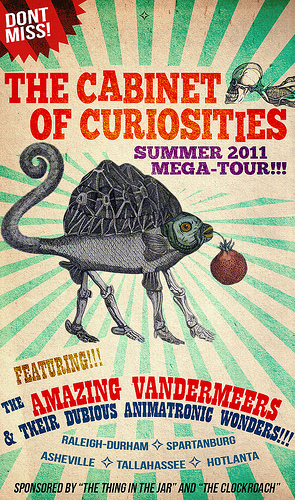
(Poster by Jeremy Zerfoss.)
July 20, 6pm, Spartanburg, South Carolina – Hub City Bookstore (186 West Main St.) – Jeff VanderMeer with Cabinet contributor Will Hindmarch and Shared Worlds' Amazon.com Visiting Writer Nnedi Okorafor (Akata Witch). Reading and signing.
July 24, 4pm, Asheville, NC, Malaprops Bookstore (55 Heyward St.) – Ann & Jeff VanderMeer offer the fascinating back-story and unexpurgated anecdotes about the immensely popular Steampunk Bible and fiction anthology The Thackery T. Lambshead Cabinet of Curiosities.
July 25, 6pm, Spartanburg, SC, Hub City Bookstore (186 West Main St.) – Ann & Jeff VanderMeer with Minister Faust (The Alchemists of Kush) and Ekaterina Sedia (Heart of Iron), both Cabinet contributors. Reading and signing.
July 30, 7pm, Raleigh-Durham, NC, Fullsteam Brewery (726 Rigsbee) – Ann & Jeff VanderMeer present a Cabinet of Curiosities Extravaganza featuring give-aways, short humorous readings, music, and great conversations. Spotlight on the debut of The Thackery T. Lambshead Cabinet of Curiosities (HarperCollins), along with Triangle author and Cabinet contributor Mur Lafferty's new fiction series. Including special guests and Lambshead contributors Ekaterina Sedia, Nadine Wilson, Scott Eagle, and S.J. Chambers (coauthor of The Steampunk Bible, also available). Sponsored by Bull Spec Magazine and the Regulator Bookstore.
August 21, 4pm, Tallahassee, FL – Ray's Steel City Saloon, lower level (515 John Knox Road) – A book release party in the editors/authors hometown, for The Thackery T. Lambshead Cabinet of Curiosities and The Steampunk Bible (with coauthor S.J. Chambers).
September 2-5, Atlanta, GA – Dragon*Con and the Decatur Book Festival – Ann and Jeff VanderMeer will participate on panels and sign books. Including a multi-media presentation on the Cabinet and The Steampunk Bible.
Fall tour schedule TBA.
More About the Editors
The VanderMeers have been featured on national NPR, the New York Times Papercuts blog, and Boing Boing. They've lectured at MIT, the Library of Congress, World of Warcraft's headquarters, and as keynote speakers at literary festivals around the world. In addition to writing novels like the critically acclaimed Finch, Jeff is the SF/Fantasy columnist for the New York Times Book Review and the assistant director of Wofford College's Shared Worlds SF/Fantasy summer teen writing camp. Ann edits the prestigious fantasy magazine Weird Tales and writes an art column for the pop culture site io9. Prior books have included The Kosher Guide to Imaginary Animals and many popular fiction anthologies.
The Cabinet of Curiosities 2011 Summer Tour: Ann & Jeff VanderMeer originally appeared on Ecstatic Days on July 6, 2011.





